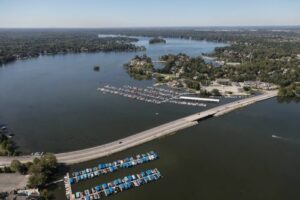
At the northeast edge of the Geist wellfield in Marion County lies the Geist Reservoir. Better known for it’s lakefront mansions and summertime swimming and boating, the reservoir also serves an important function for those living miles away: a source of drinking water via Citizen Energy’s Fall Creek treatment plant.
Created in 1943 to supply a growing Indianapolis with drinking water, the Geist Reservoir stores water to ensure an adequate supply in Fall Creek for the Fall Creek and White River water treatment plants in Indianapolis.
If you live at any location on the lake or in a neighborhood close by, it is important to protect this surface water body as well as the groundwater around it. (Citizen’s Energy also operates a Geist groundwater station to provide drinking water to Marion County.)
Taking these simple steps at home, on the lake, or nearby helps keep your fellow neighbor, animal friends, and our local environment safe and clean.
Keep fires away from the water
There’s nothing like ending a (rare!) cool Indiana summer night with a bonfire. Keep your firepit at least 50 feet away from the water to avoid ash contamination. Ash left from burning wood is high in phosphorus and can jeopardize the local ecosystem and impact water quality.
Maintain your boat
Boating can be a significant source of pollution, but there are some easy practices you can take to limit impact to our waterways.
- Have your boat professionally serviced to prevent oil and gasoline leaks
- Monitor for chipping paint
- Choose environmentally-friendly boat cleaning solutions and/or limit the use of cleaning supplies that can wash into the water
- Use a four-stroke boat motor (older two-stroke boat motors can emit up to 25-30% of their unburned gas and oil mixture into the water)
Pick up pet waste
Leaving pet waste in the yard or on the shore is a threat to both water quality (excess nutrients and pathogens) and human health. Bagging and tossing is not the only solution. You can also flush it down the toilet, install an underground pet waste digester, or bury it in several places about 12 inches deep around your yard (keep away from vegetable gardens).
Rethink your landscaping
Whether or not you live right against the water’s edge or nearby, water runoff during rains will inevitably carry excess pesticides, herbicides, and fertilizers and straight into the reservoir or storm drains. You don’t have to give up a great looking property to protect the water though. Try these tips!
- Use grass clippings on the lawn: leave clippings an inch or less in length on your lawn or store for mulch if longer. Grass clippings can serve as a slow-release organic fertilizer, thus reducing the need for extra lawn fertiziler.
- Plant native: installing native plant landscaping is a great way to reduce fertilizer and water use. Native plants need less fertilizer and water due to their ability to thrive in Indiana conditions. Native Plants Unlimited in Fishers has a great selection and helpful staff.
- Mulch leaves instead of raking: Mow leaves right into your lawn and use excess for mulching around plants or your compost pile (more tips from Bob Villa). Definitely don’t rake leaves or other debris into the lake that can cause a buildup of sediment!
Properly use and dispose of household hazardous waste
It’s easy to think of paints, solvents, and oils impacting water supplies. Using eco-friendly household cleaning products is another great way to keep chemicals out of our water. Regardless of the products you use, always be sure to store properly and follow the directions for usage and disposal. Marion County offers Saturday tox-drops and other special events where residents can take household hazardous waste (HHW) and electronic waste. If you live in Hamilton County, visit the Household Hazardous Waste Center to dispose of up to 200 pounds of HHW a month.
Have fun this summer while you are out on the lake and keep in mind our drinking water supply!
